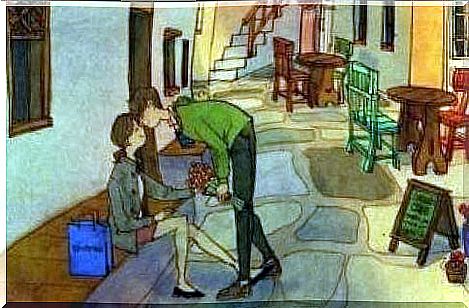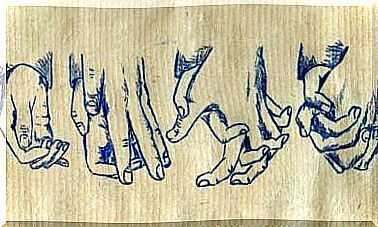The Growing Couple: You And I Will Get Together

Build up. Get together. Offer yourself to life. Get rich. Tear down the castle. Pick it up again. Wake. Sound. To sleep. Eat. Devour. Kiss. To love. Want. Argue. Not to agree. Reconcile. Smile. Embrace. Wonder. Cultivate affection. Stroke. Thrill. All this and much more is a growing couple.
Know the tastes of our partner, know their joys and fears, remember the names of their favorite painters, have intellectually stimulating conversations, have confidence and freedom, offer special details, etc. This is the emotional world of a couple, with its love maps and detailed routes.
So, from this, a couple without codependency is built? Yes. Because each one knows the concerns of the other, enhances them and does not seek to merge with them. This is an essential aspect of the growing couple.

The Love Maps of the Growing Couple
According to psychologist John Gottman, love maps are that part of our mind in which we store all relevant information about the life of our partner. Remembering this and paying attention to the changes in feelings in our partner allows us to know the vital goals of the other, their concerns and their hopes.
Thus, we must take time to complete with our partner a form of the type that is presented. Although this should be in our mind, it does not hurt to fill it in on a sheet together. It is a great exercise in hetero-knowledge. Let’s see…
Characters in my partner’s life
- Friends
- Potential friends
- Rivals, competitors, enemies
Recent important events in my partner’s life
- Imminent event (what is my partner looking forward to and what is he looking forward to)
- Current tensions of my partner
- Current concerns of my partner
Hopes and aspirations of my partner (for herself and for others)
This schematically is very enriching. Likewise, each member of the couple can write some information about themselves in a notebook and exchange the notebooks. For instance:

My struggles and my triumphs
- What event in your life are you especially proud of?
- How have these successes shaped your life? How have your idea of yourself, your abilities, your goals and the things you fight for affected?
- How important has pride been in your life (that is, the experience of being proud, being praised, expressing praise, etc)?
- Did your parents show you that they loved you? How? Was love expressed in your family? If not, what are the implications of this for your relationship?
- What role has pride in your achievements played in your relationship? What role have your own struggles played? What would you like your partner to know and understand about these aspects of yourself, your past, your present and your future plans?
My wounds and healings
- What difficulties have I gone through? Losses, disappointments, trials, problems, stress, disappointment, deep trauma …
- How have I gotten stronger? How did I channel my pain?
- How has this affected my relationship with my partner? What would you like your partner to know and understand about these aspects of yourself, your past, your present and your future plans?
- How did and how did my family express each emotion as a child?
- What is my philosophy on the expression of feelings?
- What is the difference between me and my partner when it comes to expressing? What is behind these differences? What implications does it have?
My mission, my legacy, who I want to become
- We must imagine ourselves in a cemetery before our grave: what do we want him to put in the epitaph?
- What do I want people to think of my life?
- What is my purpose? What does it mean?
- How do I want my life to be 10 years from now?
- Etc.
In knowledge is strength
It’s not about longevity in the relationship, but about the quality of intimacy. Being in contact with those external points of our lives (hobbies, for example) and with our internal world (desires, beliefs, fears, etc.) , makes a couple behave in an emotionally intelligent way.
Being connected and keeping up with the changes in the map of love that we have formed for our partner as a person and for the relationship in conjunction, helps us not to deconstruct our feelings in times of change (for example when we have a child) .
In particular, it should be said that if we want to promote a healthy relationship, we never have to relax and stop KNOWING our partner, admiring them, updating our love maps in order to get closer and thus enhance individual and joint development.









